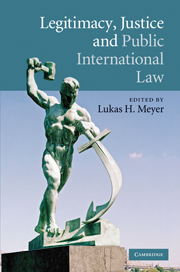Book contents
- Frontmatter
- Contents
- List of contributors
- Acknowledgements
- Introduction: Legitimacy, justice and public international law. Three perspectives on the debate
- 1 The legitimacy of global governance institutions
- 2 Institutionalising global demoi-cracy
- 3 The responsibilities and legitimacy of economic international institutions
- 4 Do international organisations play favourites? An impartialist account
- 5 ‘Victors’ justice'? Historic injustice and the legitimacy of international law
- 6 International law and global justice
- 7 Global justice: Problems of a cosmopolitan account
- 8 The responsibility to protect human rights
- 9 The threat of violence and of new military force as a challenge to international public law
- 10 Forcing a people to be free
- Index
- References
10 - Forcing a people to be free
Published online by Cambridge University Press: 03 May 2010
- Frontmatter
- Contents
- List of contributors
- Acknowledgements
- Introduction: Legitimacy, justice and public international law. Three perspectives on the debate
- 1 The legitimacy of global governance institutions
- 2 Institutionalising global demoi-cracy
- 3 The responsibilities and legitimacy of economic international institutions
- 4 Do international organisations play favourites? An impartialist account
- 5 ‘Victors’ justice'? Historic injustice and the legitimacy of international law
- 6 International law and global justice
- 7 Global justice: Problems of a cosmopolitan account
- 8 The responsibility to protect human rights
- 9 The threat of violence and of new military force as a challenge to international public law
- 10 Forcing a people to be free
- Index
- References
Summary
Is forcing a people to be free possible, and if so, is it ever morally permissible? The question cries out for clarification: what is it to be a people? What is it for a people to be forced? And what is it for a people to be free? As with so many questions in political philosophy, the hardest task here is to ask the right one, so I will spend most of my time specifying and clarifying what I am asking. When the question is well posed, it will almost answer itself, or so I hope.
The question in some form is very much on our minds, provoked by the war in Iraq and one of its stated justifications: freeing the Iraqi people from tyranny. When ‘Operation Iraqi Freedom’, as the war was called, began, President George W. Bush announced, ‘Our mission is clear: to disarm Iraq of weapons of mass destruction, to end Saddam Hussein's support for terrorism, and to free the Iraqi people’.
Now that it has been established beyond doubt that Iraq had no weapons of mass destruction at the time of the invasion, and now that the White House has acknowledged that there is no evidence at all of a connection between the 11 September terrorist attacks and Saddam Hussein's regime, the freedom argument must bear all the weight of justification for both the invasion and the extended occupation that has followed. The Bush administration's case for war initially had three legs.
- Type
- Chapter
- Information
- Legitimacy, Justice and Public International Law , pp. 270 - 310Publisher: Cambridge University PressPrint publication year: 2009
References
- 1
- Cited by

